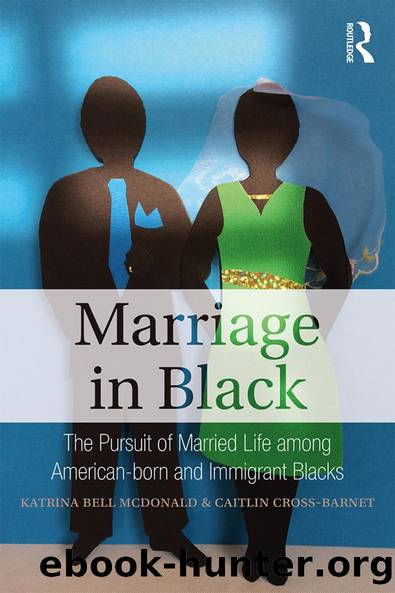Marriage in Black by Katrina Bell McDonald Caitlin Cross-Barnet

Author:Katrina Bell McDonald, Caitlin Cross-Barnet [Katrina Bell McDonald, Caitlin Cross-Barnet]
Language: eng
Format: epub
ISBN: 9781138497672
Barnesnoble:
Publisher: Taylor & Francis
Published: 2018-03-27T00:00:00+00:00
5
CONTEMPORARY BLACK MARRIAGE AND PARENTING
Mia Davis, a working-class Caribbean wife, opens the door to the tiny apartment she shares with her husband, James, also Caribbean, and their two preschool-aged daughters. The girls run in to say hello, the younger one clutching a white doll. Mia settles on the green couch in the cramped but tidy living room, and the girls snuggle against her. James joins us, sitting in an easy chair opposite from Mia and the girls. Mia helps 2-year-old Anna wrap her doll in a towel as 4-year-old Kara pretends to feed hers with a plastic bottle. The girls chatter about their plans for a tea party. James turns to them and says, âYou need to be quiet now. Go play in your room.â The girls retreat silently.
As we all know too well, stories about single mothers, deadbeat dads, and children who drop out of school and get caught up in gang activity dominate media representations of African-American families. Mothers, in particular, are pilloried for having children outside of marriage, for not offering enough supervision, and for not being good enough role models. Married black couples and black middle-class families are rarely in these narratives. While it is true that the majority of black children in the United States are born to unmarried couples, many are not, and some couples who are not married at the time of their childâs birth do eventually marry. More than a third of black children, like Anna and Kara Davis, live with two married parents. Poverty rates among blacks have declined, from over 40% in 1966 to 27% in 2012,1 and married couples have seen the strongest income gains.2
Marriage and Childbearing
This is a book about marriage, but nearly all of the study couples we interviewed had children together, manyâbut not allâbefore they officially tied the knot. Regardless of when the children arrived, couples felt having children changed the nature and purpose of their relationships. As Taylor McCoy, a working-class Caribbean wife, said, âThe children, theyâre the fruits of [marriage], and theyâre the reward, theyâre the labor ⦠I do believe marriage without kids, itâs totallyâI think it will be a whole different thing.â Overall, these couples had a variety of opinions about when to get married, when to have children, and the relationship between marriage and parenting. In their study of low-income mothers in Philadelphia, Kathryn Edin and Maria Kefalas found that many wished to become more financially stable and to test the dedication and responsibility of their childrenâs father before committing to marriage.3 Many of our couples who waited to marry until after parenting together for several years told us similar stories.
Some working-class and lower-income fathers experienced a stronger urge to marry if there was a son involved. Gwen Byrd, a working-class, American-born black mother with two biological children and two stepdaughters, was surprised when her husband indicated that their sonâs birth had influenced his plans to marry her: âIs that part of the reason you married me? Because I gave you your first son?â Her husband nodded, âUh huh.
Download
This site does not store any files on its server. We only index and link to content provided by other sites. Please contact the content providers to delete copyright contents if any and email us, we'll remove relevant links or contents immediately.
International Integration of the Brazilian Economy by Elias C. Grivoyannis(110513)
The Radium Girls by Kate Moore(12018)
Turbulence by E. J. Noyes(8040)
Nudge - Improving Decisions about Health, Wealth, and Happiness by Thaler Sunstein(7693)
The Black Swan by Nassim Nicholas Taleb(7110)
Rich Dad Poor Dad by Robert T. Kiyosaki(6613)
Pioneering Portfolio Management by David F. Swensen(6289)
Man-made Catastrophes and Risk Information Concealment by Dmitry Chernov & Didier Sornette(6007)
Zero to One by Peter Thiel(5789)
Secrecy World by Jake Bernstein(4742)
Millionaire: The Philanderer, Gambler, and Duelist Who Invented Modern Finance by Janet Gleeson(4469)
The Age of Surveillance Capitalism by Shoshana Zuboff(4279)
Skin in the Game by Nassim Nicholas Taleb(4239)
The Money Culture by Michael Lewis(4198)
Bullshit Jobs by David Graeber(4179)
Skin in the Game: Hidden Asymmetries in Daily Life by Nassim Nicholas Taleb(3992)
The Dhandho Investor by Mohnish Pabrai(3760)
The Wisdom of Finance by Mihir Desai(3735)
Blockchain Basics by Daniel Drescher(3574)
